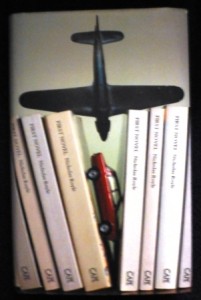No wonder NaNoWriMo (see last post) is held in November. Getting 5,000 words down, let alone 50,000, in December would be a challenge for me. I wonder whether all writers regard December as a month to (apologies for the pun) write-off.
Writers are notorious for finding displacement activities as a way of putting off sitting down at a desk and starting the hard work of putting words on the page. Suddenly tasks like ironing, filling in your tax return or going to the supermarket all acquire an attractive urgency compared with doing what you supposedly aspire to make your vocation. (I’m told this affects all writers — probably more so for those who make their livings writing as then writing equals the dreaded four letter word that begins with W.)
But December is something else again — all that precious time you normally manage to find by clearing time at weekends, grabbing the odd couple of hours on a weekday evening or even a little scribbling on the train is mercilessly elbowed aside by the extra demands of the festive season.
Like most people I’ve been up to my eyes in shopping, putting up decorations and, of course, lots of socialising. I’ve tried to convince myself that some of that socialising counts as writing-related, such as the excellent Word Factory Christmas party that I attended with Guy from the City course.
Unlike most Word Factory events, where I’ve listened to writers as diverse as Alexei Sayle, A.L. Kennedy and my own second year MA tutor, Nicholas Royle, the floor is open at the Christmas party for readings from the Word Factory audience and there were some excellent short stories read at the event by their authors, including those from friends Isabel Costello and Pete Domican (who were much braver than me by putting their names into the hat — maybe next year for me).
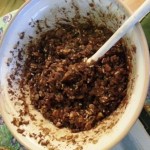
I’ve also tried to convince myself that, because food plays a large part in the novel, that all the time I’ve spent preparing mountains of home-cooked food for Christmas will contribute

as research time — that I’m connecting myself to the tastes, aromas and textures of food preparation. Perhaps there’s a case for this when I’m kneading out the dough for stollen, spicing some slow-cooked red cabbage or getting my hands up to my elbows in a mixing bowl of herby stuffing mixture but there doesn’t seem much inspiration to be found in peeling King Edwards at one in the morning (writers’ block would need to be rather severe for that to be a displacement activity).
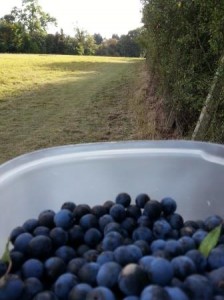
The novel also follows the rhythms of the English countryside’s changing seasons of the best part of a year — the principal characters meet in late summer, experience a few chills and blasts over winter and then burst into new life in the spring. So it’s surely for research purposes that I made my own version of the bottled essence of summer that is traditional sloe gin. The prickly business of picking over a hedgerow on a fine, early October day, gathering a couple of kilos of

the tiny purple fruits certainly gives time to meditate on the shortening days and ripening of the harvest. And the periodic shaking of the steeped liquid through early winter heightens the anticipation of its eventual bottling at the end of the year when it takes on a gorgeous deep red hue. It certainly warms you up inside when you drink it so it’s best drunk in small quantities– mine lasted until the start of Lent last year. Maybe a small slug of the 2014 vintage will kick off my writing at the start of 2015?
December is also a time for visiting family and most of mine are quite a distance away. I may have mentioned on the blog previously that I originally come from the Lancashire side South Pennines in a town hemmed in by hills. Virtually every upward glance would take in the ‘wily, windy moors’ that provided inspiration for a surprising number of great writers and poets, the most local being Ted Hughes and Sylvia Plath and, of course, the Brontë sisters. My theory is that the wild and desolate landscape represents forces of nature that can’t be conquered or subjugated by civilisation and they’re also a potent metaphor for the subconscious.

While visiting the north a few days ago I took the opportunity to revisit the Brontë Parsonage Museum (bizarrely driving about fifteen miles of the route of this summer’s Tour de France — the roads are still marked with slogans encouraging Wiggo and company). It’s a fascinating museum cataloguing the family’s life. But for me the highlight was standing in the dining room.
Maybe it’s something innately writerly but I felt transfixed in an almost religious experience when I read that this was the room where both Jane Eyre and Wuthering Heights were written, probably side-by-side at the dining table. I know Jane Eyre intimately, having studied it at school and written a dissertation on the novel and early feminism in the first year at university. To witness where the books were created (and the room is largely preserved as it was at the time) helps develop an understanding of the process of writing.

But perhaps my most tenuous piece of research was to investigate setting up a possibly lucrative sideline in Scandi-noir. At the start of December I spent the weekend in Stockholm. It was a bit crazy really — flying out first thing on Saturday and returning

Sunday night — spending about 34 hours in the city. I’d been there a few times before in my previous job (and got to know a few Swedes quite well) but a visit in December, when the light starts to fail about two in the afternoon and doesn’t return until about nine the next morning, helps to explain why the Scandinavians are particularly good at the dark side of fiction.
The northern Europeans have a reputation of doing Christmas ‘properly’ — with Germany’s Christmas markets being so popular that they’re popping up all over London — and the
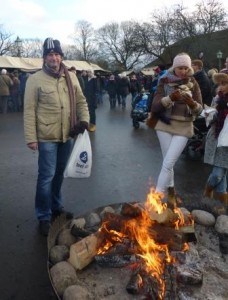
Frankfurt market that takes over Birmingham city centre is phenomenally successful. (This welcoming of other countries’ customs is another reason why I believe the British aren’t Eurosceptics at heart.)
Sweden celebrates Christmas in a way that doesn’t appear brashly commercialised — with its own traditions such as baking saffron bread and celebrating St. Lucia’s day around a
fortnight before Christmas. I visited the most famous Christmas market in Stockholm, at the Skansen open air museum, which was a relatively rustic affair with open log fires and arts and crafts and reindeer meat stalls.
Stockholm itself is a beautiful city and would provide plenty of inspiration for writers. The Vasa, an incredibly well-preserved 17th century battleship that was lifted from Stockholm harbour, is jaw-dropping when first sighted in its museum and would provide all kinds of period inspiration for historical and nautical sagas.
Another theme of the novel is looking at this country (and London, which is arguably a unique place in itself) through the eyes of a European. There’s immense insight to be gained in seeing how other countries celebrate festivals — the better to understand the unique aspects of our own.
Kim in the novel is a devoted anglophile who thinks her excellence at spoken English and several years living in London means she understands the country completely but her German logic is occasionally confounded by the sheer eccentricity of the British.
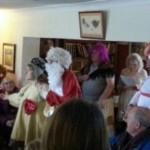
While I witnessed it much too late to go into the novel, I’d have
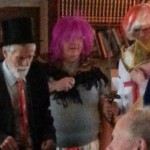
loved to write Kim’s fictional reaction to a traditional mummers’ play performed by local morris side, the Owlswick Morris, in my local pub on Boxing Day.
Mummers’ plays date back to the middle-ages as they are very
loosely based on the crusades. When I was at school we performed a Lancashire version at Easter called the Pace-Egg play. I was the Prince of Paladine and had to have a swordfight with St. Andrew, as I remember.
The version performed by Owlswick Morris gave a few more nods to contemporary sensibilities and featured, among others, Father Christmas (not principally known for crusading through the Levant) who was played by a woman and a cross-dressing St. George.
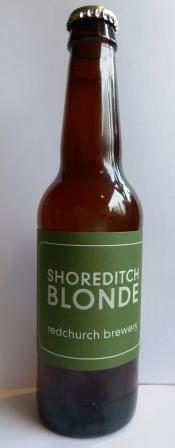
The top-hatted doctor, whose resurrection skills make him one of the most recurring characters, fortunately made an appearance to revive slain Slasher. (Who knows, he might be an early precursor of Doctor Who?).
I can see the slapstick elements of the mummers’ play appealing to Kim’s German sense of humour but I imagine she’d still be puzzling out how to interpret it several days later.
And thinking of Kim, whom my RNA reader described as a ‘great character and an unusual and original heroine’, I came across the beer in Utobeer in Borough Market that I mentioned a year or so ago on the blog was presciently appropriate for her — Redchurch Brewery‘s Shoreditch Blonde. (Not so much for the hair colour but because at the start of the novel she works in a pub near Shoreditch and her expertise with beer puts her at the vanguard of the recent popularity of craft beer. Redchurch Street in Shoreditch is also a place where she’d get out her spray cans and create her street art.)
I didn’t have a choice but to buy a bottle to open on a special occasion (like Kim, it’s sophisticated and not cheap). So what better time than New Year’s Eve?
Here’s a toast to Kim, and all my other characters, and to hope they help make 2015 a very special year. And a happy New Year to all my blog readers and best wishes for all your plans and endeavours (writing or otherwise) in the year ahead. Let’s hope it’s a good one.


